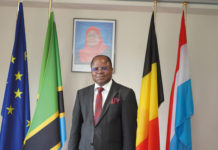After having highlighted Congo (the Democratic Republic of the Congo) in our last issue, it is now the other Congo (the Republic of the Congo) that draws our attention. Two Congo’s, two countries owing their names and their roots to the same ancestral kingdom of Kongo; two countries, whose regions despite their proximity have always had their own genetic identity in social, cultural and even economic matters. This diversity, which can also be found in the other regions or nations that form the Continent, is one of the essential building blocks of Africa.
Yet over time a lot has been done to even out the differences. Already the Berlin Conference tried to unify the living environment of many different African populations, who found themselves trapped in a singular administrative constituency by the fortunes of a random geographical demarcation. Later, two different approaches attempted to mould this cultural diversity into colonial standards: one by denying the diversity through assimilation with the system of the coloniser; the other by levelling it off into servitude.
Today, under a cosmopolitan guise and with few exceptions, systems of government – initiated in other parts of the world (with some success) – are imported into Africa, in order to create a melting-pot of individuals thrown together in the same mould.
In this respect and while talking about black Africa, and at the risk of sounding iconoclastic, I have always found it difficult to see the “Code Napoléon” being sneaked into national Constitutions. As if local populations wouldn’t have been able to survive hundreds of years just abiding by their own values. I’ve never understood why patriarchy was prescribed for a society where the organisational structure had always rested on matriarchal pillars. I’ve always stood perplexed at the introduction – under the pretext of democracy – of a one single reference system of so-called universal suffrage elections, when consensus had always been the reference. I’ll stop here, examples of similar aberrations come in numbers.
Is it necessary to say that this is where we find the roots of the chronic instability, that lies at the core of recurring economic crises and human tragedies? Sometimes the mere mention of the word “elections” sounds to me as the chronicle of murders waiting to happen. All of this just to point out that if Africa is THE continent where a manifest development should take place in the coming years, it is also clear, that entrance is and will be reserved to those who will approach its rich market knowingly and with respect of its diversity.
To help its members, the CBL-ACP places at their disposal networks of local agents but also the heads of its bilateral sections, who much more than anyone else can guide them safely through this tortuous but at the same time promising maze.

Guy Bultynck
Chairman, CBL-ACP
![[:en]edito[:]](https://perspectives-cblacp.eu/wp-content/uploads/2018/09/edito-696x407.jpg)


